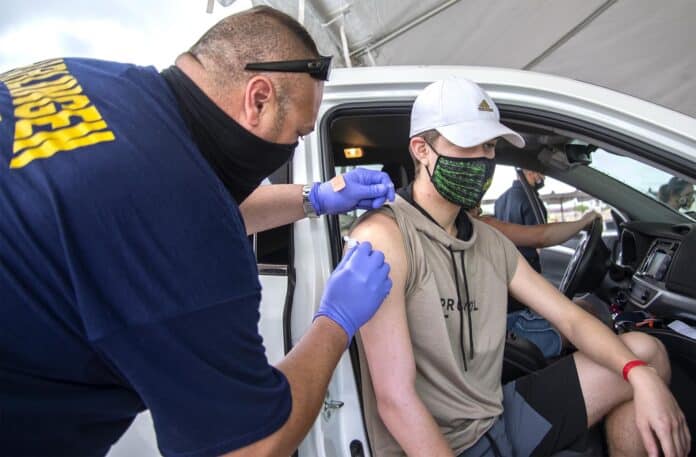
HARLINGEN — As demand for the COVID-19 vaccine drops, health officials are stopping by flea markets, game rooms and even baseball parks, where residents are rolling up their sleeves.
At the Medicine Shoppe in San Benito, pharmacist Thomas Garza is taking walk-ins, with state health officials asking him to open vaccine vials to administer as little as single doses.
“The demand has gone down significantly so we’ve had to strategize to get more people vaccinated,” Esmer Guajardo, Cameron County’s health administrator, said.
For about three weeks, health officials have been planning to scale down big vaccination clinics in favor of smaller, mobile clinics targeting residents at work and play to boost the vaccination rate.
“We’re dealing with vaccine hesitancy,” Guajardo said. “We’re addressing accessibility. It’s more talking to smaller groups of individuals and organizations. They have questions. They want to go one-on-one. We know the strategy we want to take is working with organizations that the public trusts such as faith-based groups and employers.”
State stops shipping directly to vaccine providers
Across Texas, the vaccination rate’s dropped to the point health state health officials have stopped directly shipping state-approved providers weekly vaccine allocations.
Since about mid April, the state’s direct weekly shipments were leading providers to rack up surplus vaccine doses.
Now, state health officials are requesting providers order specified dosages, Lara Anton, the state health department’s spokeswoman, stated.
“This is a big step in vaccine distribution,” said Imelda Garcia, the state health department’s associate commissioner for laboratory and infectious disease services. “The ability to ship vaccine to pharmacies, doctors’ offices and other providers as they need it will go a long way to making sure it is available when and where Texans want to be vaccinated.”
Across the country, manufacturers ramped up vaccine production before the vaccination rate dropped off last month.
“Vaccine is available more widely than ever at hundreds of locations across Texas, many with no waiting and no appointment needed,” Anton stated. “Convenience will be key to getting the next group of Texans vaccinated and DSHS is working with existing providers, employers and community organizations to make vaccination as easy as possible.”
Pharmacies offering vaccine to walk-ins
Now, many pharmacies are offering the vaccine to walk-in customers.
“We transitioned from the bigger clinics to mostly in-store,” Garza said at the family-owned pharmacy.
At the Medicine Shoppe, he’s administered about 6,000 doses since February, setting up school district vaccination clinics administering as many as 1,500 doses.
“In the last three or four weeks, it’s changed,” Garza said. “Nowadays, you almost got to beg or pull teeth. There’s just more vaccine. We were hitting the vaccine hesitancy wall.”
On May 4, state health officials sent him an email recommending he administer the vaccine to walk-in customers.
“It’s not to turn anyone away,” Garza said. “If someone comes in, they recommend we open the vial.”
Now, he’s administering as much as 40 percent of his doses in the pharmacy.
Facing new target groups
When the state’s vaccination program opened in mid December, health officials were targeting groups of residents 65 and older and those with underlying medical conditions who were ready to roll up their sleeves for the long-awaited vaccine.
Now, with vaccine flowing across the country, health officials are facing a population of working residents, others concerned about the vaccine’s safety after reports tied Johnson & Johnson’s vaccine to a rare blood-clotting condition, and some holding out on taking the shot.
“We’re moving to a phase in which people want to be vaccinated but they don’t know where to go,” Jared Hockema, Port Isabel’s city manager, said. “I attribute it to issues like outreach on our part and logistical issues of the patient — we’ve got people working or people at home with kids. We’re looking at ways to be more accessible. We try to move our clinics around to make it more accessible.”
Reaching into the community
In Harlingen, health officials are planning to launch a mobile clinic targeting sites such as workplaces and churches.
“Now we’ve got to get to the groups who want it but can’t leave work to go to a vaccination clinic so we’re going to the work site,” Josh Ramirez, the city’s public health director, said. “We continue education that the vaccine is safe, that the risks are nil.”
Rolling up sleeves at work, play
Across Cameron and Willacy counties, mass vaccination clinics are making way for smaller mobile clinics.
In Brownsville, Guajardo’s setting up clinics at the 77 Flea Market, where health officials vaccinated about 300 residents late last month.
“We changed our strategy,” Ben Clinton, deputy superintendent at the Raymondville school district, said, referring to the shift in Willacy County’s vaccination program.
In Raymondville, health officials have been holding small evening and weekend clinics to target working residents and even stopping by game rooms, where they’ve vaccinated about 50 players.
“The health department was concerned game rooms would be a place where COVID was spread,” Clinton said.
At a Raymondville baseball park, he said, health officials vaccinated about eight fans.
“We’ve been real successful with the pop-up clinics,” he said.
For bigger vaccine providers like Willacy County, the state’s sending the same message as its sending pharmacies.
“Don’t hesitate even it’s just one person,” Clinton said, noting each vaccine vial contains 10 doses. “We can pierce a vial for just one person.”




